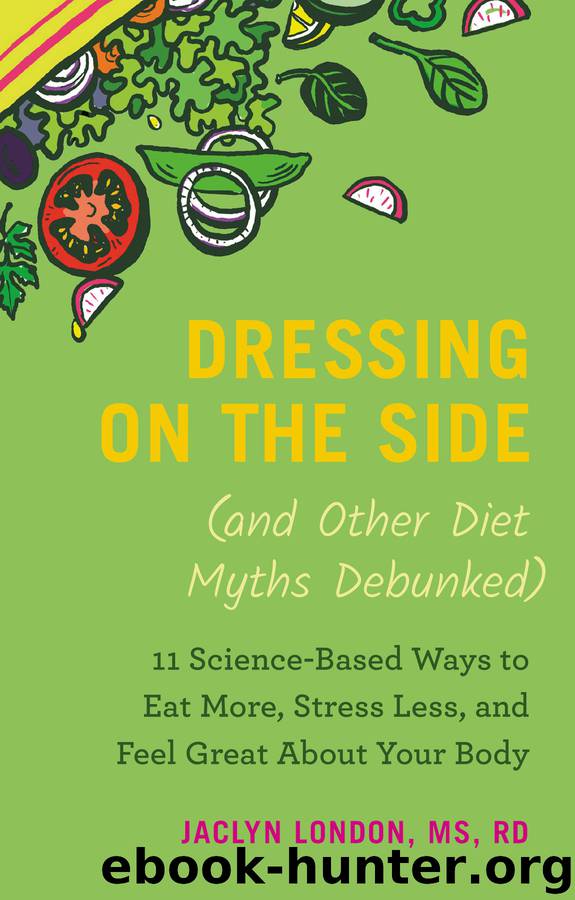Dressing on the Side (and Other Diet Myths Debunked) by Jaclyn London

Author:Jaclyn London
Language: eng
Format: epub
Publisher: Grand Central Publishing
Published: 2018-12-10T16:00:00+00:00
The Claims Decoder
Too many claims are misunderstood. Here is the short list of food examples with sexy claims that aren’t all that great for you:
Healthy: Sneaky junk-food examples: breakfast items and pastries like Pop-Tarts, sugary cereals, orange juice, and breakfast breads (all of which might claim, “Healthy choice for the whole family!”).
Simple/simply; traditional: These are 2018’s new words meaning “natural.” You’ll see them on the aforementioned potato chips, sauces, dips, and basically any processed food that had used an ingredient in a prior version that might have been subjected to genetic modification (e.g., corn and soybeans).
No sugar added: Sneaky junk-food examples: fruit snacks and smoothies that use “fruit juice concentrate” to get around the FDA labeling law.
All-natural: Sneaky junk-food examples: cookies, candy, chips—your average supermarket snack staples—might be labeled “all natural,” as well as veggie chips, granola bars, and cereal. Since the term is left undefined by the FDA, it’s still allowed despite the efforts of major food companies to get rid of it.
No artificial sweetener: Lots of yogurt and yogurt drinks make this claim but are loaded up with chicory root fiber, stevia, and inulin—these are not “artificial” by FDA definition, but if you’re sensitive to sugar substitutes (and many of us may be unknowingly sensitive), they can upset your GI tract. Plus, if you’re cooking with them (e.g., using a plain Greek yogurt made with chicory root), you can expect these to be sweet-tasting rather than savory.
No cholesterol: Sneaky junk-food examples: grains of all kinds—from rice to bagels to whole-grain cereals. This unnecessary claim is still out there… even though the only foods that contain dietary sources of cholesterol are from animals (dairy, meat, fish—nothing plant-based should have cholesterol to begin with!). The only ingredients in a potato chip are often potatoes, oil, and salt. So why oh why would cholesterol be in there in the first place?! Food companies are still allowed to use “no cholesterol” if the product contains 2 g or more of saturated fat.
Vegan: Sneaky junk-food examples: snack mixes and snack bars. Just because there’s a halo around “vegan” diets doesn’t mean vegan products are any better for you than options that aren’t vegan. They’re often sugar bombs, also loaded with added saturated fat and sodium. One such culprit is often “coconut oil,” which is lauded for its “health benefits,” all of which are totally bogus.
Download
This site does not store any files on its server. We only index and link to content provided by other sites. Please contact the content providers to delete copyright contents if any and email us, we'll remove relevant links or contents immediately.
Nutrition for Sport, Exercise, and Health by Spano Marie & Kruskall Laura & Thomas D. Travis(3774)
Nutrition for Sport, Exercise, and Health by Marie Spano & Laura Kruskall & D. Travis Thomas(3723)
The Sprouting Book by Ann Wigmore(3587)
Flavor Flours by Alice Medrich(2861)
Superfood Smoothie Bowls: Delicious, Satisfying, Protein-Packed Blends that Boost Energy and Burn Fat by Chace Daniella(2456)
Memory Rescue by Daniel G. Amen(2418)
Dirty Genes by Ben Lynch(2313)
The Bad Food Bible by Aaron Carroll(2271)
Genius Foods by Max Lugavere(2217)
The Poisoner's Handbook by Deborah Blum(2135)
Good Calories, Bad Calories by Gary Taubes(2107)
The Main Street Vegan Academy Cookbook by Victoria Moran(2086)
The I Quit Sugar Cookbook by Sarah Wilson(2038)
Core Performance Essentials by Mark Verstegen(2009)
Memory Rescue: Supercharge Your Brain, Reverse Memory Loss, and Remember What Matters Most by Amen Dr. Daniel G(1975)
Big Girls Do It Stronger by Jasinda Wilder(1954)
Android App Development by Franceschi Hervé J.;(1841)
Sugar Crush by Dr. Richard Jacoby(1795)
Dr. Colbert's Keto Zone Diet by Don Colbert(1651)
